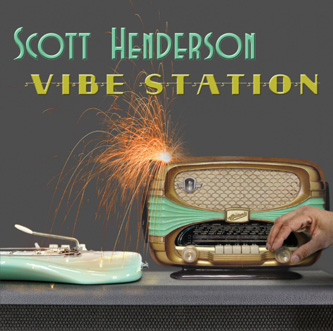 On
August 26, 1954, West Palm Beach, Florida got more than they bargained
for, a future genius with a guitar…and a problem with authority!
Actually, we’re joking because Scott pays the highest degree
of homage to all of his musical influences, past and present. A friendship
and partnership would eventually emerge, with virtuosi bassist Gary
Willis, keyboardist Scott Kinsey and drummer Kirk Covington. The band
would be called Tribal Tech and its recordings would be revered for
over a generation, Scott’s other blistering fretboard work with
Chick Corea, Jean Luc Ponty, Zawinul, and Wayne Shorter would earn
him the #1 Jazz Guitarist in Guitar World Magazine in 1991 and top
spot in the 1992 Guitar Player Magazine’s Best Jazz Guitarist
Reader’s Poll. Scott Henderson’ first solo album, Dog
Party earned Guitar Player’s best blues album of 1994.
On
August 26, 1954, West Palm Beach, Florida got more than they bargained
for, a future genius with a guitar…and a problem with authority!
Actually, we’re joking because Scott pays the highest degree
of homage to all of his musical influences, past and present. A friendship
and partnership would eventually emerge, with virtuosi bassist Gary
Willis, keyboardist Scott Kinsey and drummer Kirk Covington. The band
would be called Tribal Tech and its recordings would be revered for
over a generation, Scott’s other blistering fretboard work with
Chick Corea, Jean Luc Ponty, Zawinul, and Wayne Shorter would earn
him the #1 Jazz Guitarist in Guitar World Magazine in 1991 and top
spot in the 1992 Guitar Player Magazine’s Best Jazz Guitarist
Reader’s Poll. Scott Henderson’ first solo album, Dog
Party earned Guitar Player’s best blues album of 1994.
The CD, Vibe Station, released in May, 2015 is a journey that
will traverse a variety of musical genres including reggae, fusion,
blues, more blues, rock, jazz, even a touch of country, and we even
opened a brand new category for Scott called "pastoral spike
collar". Any music listener would love this album, but if you
are a guitar player, then clearly, you need to own this album. Scott’s
modal vocabulary is so baked in, that he never even breaks a sweat
when soloing over even the most complex chord changes.
And while it would be impossible to out-Beck Jeff Beck at his amazing
whammy technique, Scott is also great with the whammy bar and further
fattens up his single note playing with finger style in a sound that
projects sassiness and attitude. Of course, the influence of blues
legends like Albert King and some of his contemporaries have lent
ideas, as Scott discusses later on, and like Frank Zappa, Scott often
puts humorous twists on his song titles.
Bassist, Travis Carlton and drummer, Alan Hertz also deserve a lot
of praise for providing their thundering and highly demanding performances
on this album. 2015's Vibe Station is Scott’s first release
in three years and unlike some of the prior work, Scott had creative
control over the entire album. “I put my heart and soul into
it… I work long hours every day and I’m very meticulous
about every little tone and phrase. I just want it to be right."
I was struck by the ease of versatility in Scott’s effortless
manner of playing through several styles within a single song. You
could even say that the Vibe Station album is similar to the
weather in Baltimore…If there’s something about it you don’t
like, wait a minute and it will change! “It’s the A.D.D.!”
Scott says. The songs are complex but tight and never meandering.
“Church of Xotic Dance”- Opens like a cosmic Bob Marley
tune, its background chord atmospheres at once dispelling any notion
that only keyboards can make wild sound effects. The song moves along
through
an outline reminiscent of Cab Calloway’s "Minny The Moocher",
then by way of some extremely clever chord changes, into a blues groove.
The music breaks for several uncommon but beautiful chords into a
swing beat blues shuffle and finally back to the main theme. “If
I started a religion, it would definitely have something to do with
strippers!” says Scott.
“Sphinx” – Old school rock fans be forewarned. Scott’s
sound throughout this tune is huge, and glides along. It’s a
main theme of a Lydian-based melody, which instantly adds an exotic
middle-eastern vibe to the song. The dominant 7th augmented 2nd ("Stone
Free") chord gives us a hint of Jimi, and the elastic sounding
melodies calls Jeff Beck to mind just before Scott reaches into his
bag of pedals to unleash a riveting and frenzied guitar solo, the
number pounding along a heavy blues-rock motif, further supercharging
Scott’s wizardry. The solo gives way to a reprisal of the main
theme and a chord change distantly reminiscent of the chords to “Hey
Joe”, but, of course, much more complex, large and ominous sounding.
“Vibe Station” – The intro mimics the sound of someone
turning a radio dial to tune in a station, and then out comes the
title track, a highly charged funky fusion tune, packed full of Scott’s
blistering riffage, not to mention a tight and athletic drum performance,
twisting and turning like a roller coaster ride through many brilliantly
executed chord progressions and some accenting material at the conclusion
that is reminiscent of the earlier Tribal Tech style.
“Manic Carpet” – A tune that fires an all-out sonic
assault on all senses with adrenaline-surging bass and drums as the
backdrop to a fiery electric sitar performance. Scott cites his inspiration
for the sitar solo as being from Steely Dan’s original guitarist,
Denny Diaz “That sitar solo on Manic Carpet Ride was definitely
inspired by the sitar solo in “Do It Again” though I might
have taken it a little more out...” Yeah sure, Scott, just a
little...
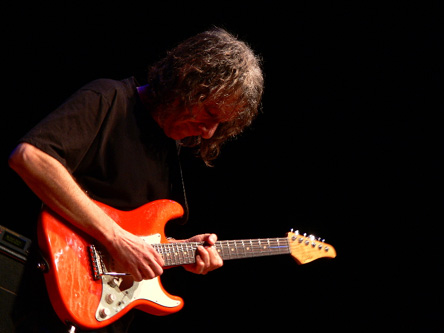 “Calhoun”
– Another brilliantly shining tune, “Calhoun” is a
truly elegant and sophisticated number with an organic sounding blues
theme that could belong to Jimi or Steve Cropper, and showcases Scott’s
virtuosity in threading great sounding, jazz chord progressions that
build and peak to great beauty. This song shimmers from intro to ending,
features a great guitar solo, and extracts tones that makes this song
one of the great tunes played on a Stratocaster (actually a Surh SH-Classic).
“Calhoun”
– Another brilliantly shining tune, “Calhoun” is a
truly elegant and sophisticated number with an organic sounding blues
theme that could belong to Jimi or Steve Cropper, and showcases Scott’s
virtuosity in threading great sounding, jazz chord progressions that
build and peak to great beauty. This song shimmers from intro to ending,
features a great guitar solo, and extracts tones that makes this song
one of the great tunes played on a Stratocaster (actually a Surh SH-Classic).
“The Covered Head” – Scott gets his blues face on and
digs in. This tune sounded the most like a live tune, and grooves
to a familiar type of I-IV-I-VI-II-V blues progression. Scott’s
remarkable solo work on this tune is replete with legato madness and
wild lines. Travis and Alan are spotlighted also on several breaks
during the tune.
“Festival of Ghosts” – This tune stands out to feature
a beckoning melody set to a background of a three chord descending/ascending
progression. As the song unfolds, its chord chemistry produces fusion
in its finest form, building crescendos and reaching the highest point
of musical drama, since “Rituals” and “The Necessary
Blonde”. Fine fretboard work pervades throughout as Scott executes
a beautifully melodic, yet bluesy solo and accentuates his solos with
squeals, and feedback. In the final solo section, Scott invokes a
guitar effect that sounds as though it wants to explode straight through
the front of the speaker cones, not unlike the way that Dan O’Bannon’s
"Alien" ripped through John Hurt’s stomach. We found
this to be a very haunting tune… come on, we just couldn’t
resist!
“Dew Wut?” – A tune that begins with a country riff
and morphs into a blues rock tune. The song’s central theme consists
of a hard driving old-school rock pattern. In the solo section, there
is a Jeff Beck meets Johnny Hiland vibe, all while the drummer and
bass thunder along before Scott finally breaks into a wah-wah solo.
Alan Hertz tears up on this tune with excellent drumming as Travis
Carlton delivers the beef on the surging bass line during the solo.
The farm aninal noises are humorous, and we’re sure having something
to do with the song title but I’m almost afraid to ask.
“Chelsea Bridge” – Inspired by the Buddy Rich version
of the same tune, Scott ends the album with a nod to tradition on
a beautiful jazz guitar version of Billy Strayhorn’s tune.
To anyone with any familiarity with Scott, he loves to play his guitar.
In this September 2015 interview, Scott talks about making the new
record, his approach to writing and practicing, song writing with
Gary Willis, his gear and effects, and he offers a glimpse of the
guys he listens to (hint, they're definitely not all guitar players).
Scott also reveals how he built the soundproof room in his house that
allows him to record with his 100 watt amp turned nearly all the way
up. Music Web Express 3000 is thrilled to have the opportunity to
feature Scott Henderson and his brilliant 2015 CD Vibe Station.
MWE3.com
presents an interview with
Fusion Guitar Legend
Scott Henderson
Review and interview written and produced by
Eric Paulos and Robert Silverstein for mwe3.com
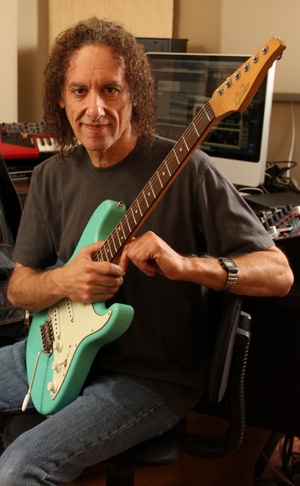 MWE3:
Scott, how’s it going man?
MWE3:
Scott, how’s it going man?
SH: Good, how are you doing?
MWE3: I’m absolutely floored by your new album, Vibe
Station!
SH: Oh, thank you, man!
MWE3: Sorry for putting you on a speakerphone
SH: No problem man, I hear you fine!
MWE3: I want to ask you some questions about the new record
because it’s absolutely and ridiculously over the top excellent,
man!
SH: I really appreciate that, thanks!
MWE3: I understand that you have been working on this album
for over a year, Scott.
SH: Well, it wouldn’t have taken that long but I’ve
been touring, so in between family stuff and touring, it’s not
like I can just lock myself in my room and ignore my 11 year old daughter.
And I’ve toured quite a bit, so I work on the album when I can.
MWE3: So you’ve given guitar lessons to strangers, is
your daughter taking guitar lessons from you?
SH: No, no, she takes piano, she plays Chopin! She’s ridiculous,
she’s way more talented than me!
MWE3: You’re too humble! I’ve actually met you a
couple of times in the early 2000s when you played at Club La Va Lee
when it was still open, you played there with your blues band a few
times, including Kirk (Covington) and Scott (Kinsey), and that was
outstanding.
SH: Yeah, sure.
MWE3: There’s a heavy blues influence on this album, I
just want to start off by saying it is your first release in three
years and guitar players are absolutely going to revel in all the
guitar ear candy that’s on this record! There seem to be a lot
of new techniques and what I hear as new surprises on this record.
SH: Well I appreciate that, I know I can’t reinvent myself
every day, but I feel like I grow as a guitar player a little bit
every year as we all do, and I hopefully there’s some new stuff
that people haven’t heard before.
MWE3: Absolutely and speaking of recording while on tour, I
think that Led Zeppelin did that on their Led Zeppelin II album
and they recorded that while they were on tour, and we know how THAT
album turned out!
SH: Yeah, well I didn’t actually record on the road, I
recorded here, but I just meant that I just couldn’t record because
of being on the road…
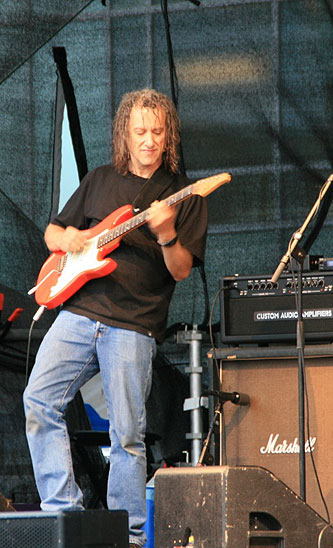 MWE3:
Did you feel while you were recording the record, Scott, did you feel
a certain amount of pressure because you are a worldwide regarded
and respected as one of, if not the top fusion guitar player in the
world! So when you recorded the album, did you think to yourself,
“Hey, it’s been three years and this better be a blockbuster
or it ain’t going to press!”
MWE3:
Did you feel while you were recording the record, Scott, did you feel
a certain amount of pressure because you are a worldwide regarded
and respected as one of, if not the top fusion guitar player in the
world! So when you recorded the album, did you think to yourself,
“Hey, it’s been three years and this better be a blockbuster
or it ain’t going to press!”
SH: Well, I mean, that’s my mindset every time I do a
record, that I find it great, and you know, whether it is or not only
history can tell (laughter). That’s the intent anyway, I put
my heart and soul into it, and I work long hours every day and I’m
very meticulous about every little tone and phrase. I just want it
to be right, you know, and I remember what Chet Atkins said when they
asked him the same question and he said “Well I just keep doing
it until I get it right!” (laughter). That’s kind of how
I feel. And I know that I like the album now, but I’m sure that
in a couple of months, I’m going to listen to it after I’ve
learned how to get some better tones than the ones that are on this
record and I’m going start going “Arghh! I screwed that
up, or I screwed this up and I’m going to make it better on the
next one!” So, it’s like a growing process, you know. I’m
one of those guys that looks back at his previous works and I don’t
care for it much.
MWE3: That sounds like your ethic and philosophy and I’ve
heard that from Allan Holdsworth as well!
SH: (Laughter) Yeah, he’s worse than me! (more laughter).
Wow, talk about being critical of myself, I mean, I’m critical
of myself, but only up to a point. I think he takes it a little too
far, he’s a great player and he really doesn’t need to be
that critical of himself, he’s a monster! (laughter)
MWE3: You and Allan Holdsworth are great friends! He speaks
very highly of you, and I’m just curious why you and Allan haven’t
thought about recording a record together?
SH: Well, it’s the same thing for me and my other guitar
friends. I’m really close friends with Mike Laundau, and Bruce
Forman, and all of these monster players, and sometimes you’re
just so busy doing your own thing that there just isn’t time.
Like, you know this project that I do with Jeff Berlin and Dennis
Chambers, HBC, I mean, we don’t even have time to write music
for that project! Because for me, writing music is without a doubt,
the most difficult of all the things there are to be done in music.
Composition is the most taxing…it’s the most narcissistic…
MWE3: You know they say that the intersection of total narcissism
and crippling self-doubt is art. I see your picture right there in
the middle!
SH: (Laughter) That is true! I’m more of the crippling
self-doubt! (more laughter)
MWE3: You’d be in a minority of one, Scott!
SH: Haha, you know, there’s that balance where you think
you’re the greatest thing on earth and you’ve written the
most amazing piece of music and then think “This is a total piece
of crap!” (Laughter)
MWE3: I’ve heard similar sentiments expressed by the likes
of John Lennon, so I think that’s the nature of the beast.
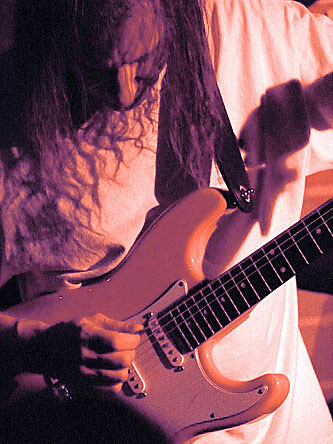 SH:
It’s the nature of the beast and it’s my least favorite
and yet most rewarding thing in music is composing, and when I think
about doing it, I pretty much only have one life, and I’m going
to spend that portion of my life writing for my own band. So since
HBC, Jeff and Dennis, it’s been more of a touring thing and none
of us really have time to write music for it since we’re writing
for our own groups, we thought it would be fun to just do covers so
that’s what we do in that band, and to tell you the truth, it’s
a fun break from playing our own tunes. So we get to play the music
of our heroes like Zawinul and Wayne Shorter, and Herbie Hancock,
and it’s a blast! So I’m kind of glad that I do have an
outlet that I don’t have to write for, that I can just show up
and play these fun tunes, sort of like a fusion top-40 band, and it’s
fun!
SH:
It’s the nature of the beast and it’s my least favorite
and yet most rewarding thing in music is composing, and when I think
about doing it, I pretty much only have one life, and I’m going
to spend that portion of my life writing for my own band. So since
HBC, Jeff and Dennis, it’s been more of a touring thing and none
of us really have time to write music for it since we’re writing
for our own groups, we thought it would be fun to just do covers so
that’s what we do in that band, and to tell you the truth, it’s
a fun break from playing our own tunes. So we get to play the music
of our heroes like Zawinul and Wayne Shorter, and Herbie Hancock,
and it’s a blast! So I’m kind of glad that I do have an
outlet that I don’t have to write for, that I can just show up
and play these fun tunes, sort of like a fusion top-40 band, and it’s
fun!
MWE3: Yeah, and that’s outstanding! How did you get on
with your old members of Tribal Tech when you were recording X?
SH: Well, Willis came back from being gone for a long time
in Spain without coming back, I believe he came back for a NAMM show,
and we figured as long as he is in town, let’s get him and do
a recording. You know, Tribal Tech never really officially broke up.
It’s just that Willis moved to Spain and married this Spanish
girl, and I can’t say I blame him. So we just knew that if he
came back and was able to hang for a while in L.A., at some point
we could do another record, so we did, and that’s what X
was about. We had a good time recording it, and who knows, maybe in
the future we’ll do another one, who knows? That band is unpredictable.
MWE3: What I think of when I think of Tribal Tech other than
the monstrous playing, is the great writing and the synergy between
you and Gary in your song writing. You guys were like the Lennon/McCartney
of fusion.
SH: Oh thanks! Or I always think of Donald Fagen and Walter
Becker or Wayne Shorter when I think of the greatest writing teams!
Those are the people I really look up to.
MWE3: They’re definitely at the top of the mountain, listen,
a little about Vibe Station – “Church of Xotic Dance”
– The introspection within that tune is overwhelming! There are
a number of playing styles on that track. It begins with a reggae
feel and you’re going from a section of slow blues to swing and
shuffle, it’s just a tremendous record and tune.
SH: That’s just the A.D.D., not being able to pay attention
(laughter). I’m afraid that’s what people think when they
listen to my records, they think “Oh, THIS guy has A.D.D. for
sure! He can’t pay attention to one style of music to stay there
for very long” but I am very influenced by many different types
of music and I’m one of those lucky people, I feel that I’m
fortunate to find beauty in just about any type of music. There’s
good music in every style and if it’s good music, I’m a
fan. I see some people in the States especially who are more clique
oriented or fad oriented to them because the music is more to them
than just notes, it’s lyrics and the lyrics sort of suggest a
lifestyle. So some of the metal guys are unlikely to listen to Beyonce,
some of the pop fans aren’t going to listen to jazz. It’s
sad because the people who are close-minded to music miss out on a
lot.
MWE3: Sure...
 SH:
I’m one of those guys that can appreciate Led Zeppelin and I
love them and also Miles Davis, and the country guys like Johnny Hiland
and Albert Lee, the classical music of Mozart, Bartok and since my
wife is a classical pianist, I hear a lot of that music and I love
it. So I’m just a lucky guy to be able to appreciate a lot of
different music and not surprisingly, some of my favorite musicians
like Bruce Forman, who is a total straight ahead, very purist jazz
guitarist, doesn’t have a purist mentality, he loves Led Zeppelin
too, and loves all different kinds of music. So just because some
guys chooses to play a more pure style of music doesn’t necessarily
mean they don’t appreciate also different kinds of music too,
just because they don’t play it. But I kind of take it to the
next step, I not only appreciate it, I want to do it! (laughs). I
want to play rock and roll, I want to play jazz, I want to play funk,
I want to play blues, and I do! And I can! (laughs)
SH:
I’m one of those guys that can appreciate Led Zeppelin and I
love them and also Miles Davis, and the country guys like Johnny Hiland
and Albert Lee, the classical music of Mozart, Bartok and since my
wife is a classical pianist, I hear a lot of that music and I love
it. So I’m just a lucky guy to be able to appreciate a lot of
different music and not surprisingly, some of my favorite musicians
like Bruce Forman, who is a total straight ahead, very purist jazz
guitarist, doesn’t have a purist mentality, he loves Led Zeppelin
too, and loves all different kinds of music. So just because some
guys chooses to play a more pure style of music doesn’t necessarily
mean they don’t appreciate also different kinds of music too,
just because they don’t play it. But I kind of take it to the
next step, I not only appreciate it, I want to do it! (laughs). I
want to play rock and roll, I want to play jazz, I want to play funk,
I want to play blues, and I do! And I can! (laughs)
MWE3: Speaking of A.D.D., I love some of your song titles like
“Manic Carpet Ride” and I don’t think I’ve ever
heard an electric sitar that was played like that.
SH: Yeah you have! Remember the solo on “Do It Again”?
MWE3: Oh yeah! Danny Diaz! He’s a monster!
SH: Yeah, Danny Diaz, one of my all time, favorite guitar players!
He was brilliant! His solo on “Bodhisattva” and a lot of
my favorite Steely Dan solos.
MWE3: I think he (Diaz) played some of the solos in the tune
"Aja" as well.
SH: Yeah, he’s just brilliant! He’s always been of
my favorite guitarists growing up to listen to. That sitar solo on
"Manic Carpet Ride" was definitely inspired by the sitar
solo in “Do It Again” though I might have taken it a little
more out (laughs).
MWE3: I think so, we are going levels three dimensionally beyond
the usual pentatonic runs.
SH: Yes, the noncommercial version.
MWE3: Since most of our audience is other musicians and your
fans, I’m sure that they’ll definitely appreciate that...
Something I’ve never heard from you that I can recall from your
records, and I think at the beginning of "Dew Wut?" where
it almost sounds like a country run at the beginning of the tune.
SH: Yeah, it’s a Tele, I wanted to play a Tele on that
one, it’s a Suhr Tele and I did something similar on Well
To the Bone on the song "Hillbilly In The Band". That
was actually a Strat but same kind of mentality, just trying to emulate
some of my favorite country guitarists. I’m a big Johnny Hiland
and a big Albert Lee fan and a big Steve Trovato fan and always envious
of these country guys that have twenty times more chops than me! (laughs).
They’re just amazing! There’s Jerry Douglas…there’s
just so many good ones, I’m not a big country music listener
but I know that in Nashville, there’s tons of incredible, incredible
guitar players.
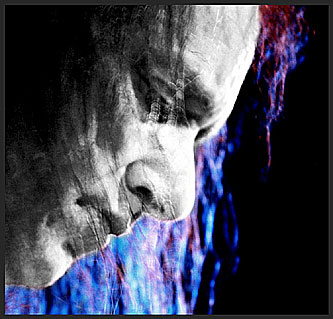 MWE3:
Absolutely. "Chelsea Bridge" seems to be as close to a straight
ahead jazz tune as definitely anything from this album and from long
back. Did you play that on an acoustic jazz guitar?
MWE3:
Absolutely. "Chelsea Bridge" seems to be as close to a straight
ahead jazz tune as definitely anything from this album and from long
back. Did you play that on an acoustic jazz guitar?
SH: Yes, in fact, Bruce Forman loaned me a beautiful instrument.
The maker of the guitar is Sonntag, a German luthier who built that
guitar especially for Bruce, and Bruce loaned it to me for the record,
and what a wonderful sounding instrument... I mean that thing just
sounds gorgeous!
MWE3: Yeah man, it was absolutely beautiful, the note bloom
on that guitar.
SH: And easy to play too! I remember Bruce telling me when
I borrowed it from him, I asked him “Well what gauge strings
does it have?” and he says “.012s!” And I said, “Oh
my God! I’m gonna die!” (laughter) but it was actually really
easy to play and just a beautiful instrument. I just love it and I
will definitely borrow it again if he’ll loan it to me! (laughs)
MWE3: I don’t blame you, I thought I was hearing Wes Montgomery
with his L5…
SH: What a great sound… what a beautiful guitar!
MWE3: Yeah, the bloom is really prominent in that song and
it’s a really wonderful tune as well.
SH: It is, it’s a beautiful tune. There’s a version
that I love by the Buddy Rich Big Band and they played the hell out
of that tune. It’s on Best of Buddy Rich and it’s
a live recording of Buddy Rich Big Band playing "Chelsea Bridge"
and it’s one of the best versions I’ve ever heard and I’ve
always loved that version since I was a kid.
MWE3: Do you get a lot of your inspiration from saxophone players
and other types of musicians?
SH: Sure, I’m always inspired and bewildered by some of
these excellent players who are just amazing like all of the guys
that you already know about like Coltrane, and Cannonball Adderley,
and Joe Henderson, all the famous ones that you know, but there are
some other ones, like Chris Potter, some of the new guys like Shamus
Blake, Mark Turner, Joshua Redman, they’re all fantastic players
and I always draw inspiration from those guys.
 MWE3:
So tell me, do you have any memories of West Palm Beach and when you
studied music theory under Bill Prince?
MWE3:
So tell me, do you have any memories of West Palm Beach and when you
studied music theory under Bill Prince?
SH: Yeah, sure, that’s my stomping grounds, and in fact
I was thinking of taking my family for a vacation down there this
summer, just to see where I grew up, because they’ve never been
down there.
MWE3: Awesome!
SH: Yeah, you know unfortunately, when I lived there, I managed
to stay working, and in fact that’s how I learned to play the
guitar really, from when I was sixteen, I was gigging every night
down there in those bars playing top-40 or playing whatever. Toward
the end of the time around 1980, disco had moved in, in the ‘70s
and made it harder to work, there weren’t as many gigs, so I
thought “If I’m going to not work, I’d rather not work
in Los Angeles than West Palm Beach.” So I moved to L.A. to go
to G.I.T. which was a great benefit for me because Pat Martino and
Joe Diorio were both teaching there. Ron Eschete and a lot of great
teachers, Don Mock, and I learned a lot there and it got me to L.A
where I met some people who helped me get some good gigs like my first
sort of known gig was with Jeff Berlin, and I played on his first
album, and it was his first album as a leader, and it was my very
first recording. So it was a big deal for me from there, I went to
play with Jean Luc Ponty and then Chick and Zawinul, and I was lucky
to get some great gigs out here.
MWE3: You played with Jean Luc Ponty on "Infinite Pursuit"
from the Fables album. Some of the guitar lines were crazy
that you played and almost sounded in the first violin/guitar interaction
passage as though you overplayed the measure, but in a very musical
way.
SH: That tune was in different time signatures and I remember
practicing it for a long time because it was really difficult and
that was one of the the first and only times I had to play a solo
on a record with a different time signature. I’ll be the first
to say that I suck at different time signatures. I’m not John
McLaughlin who plays every time signature in the world. My rhythmic
vocabulary ends with Kool and the Gang (laughter).
MWE3: That’s really hard to believe with the complexity
of some of those Tribal Tech tunes!
SH: I listen to Meshuggah sometimes, I swear, and actually,
I talked to one of those guys and he told me that all their music
was in 4, but the accents are so crazy, and I’m a big fan. I
love that band and so I would hate to have to learn that music, it’s
too hard! (laughs)
MWE3: Now your philosophy on the blues sort of flies in the
face of a lot of snobby fusion guitar players that don’t listen
to the blues. I even heard an interview Allan Holdsworth video that
was a combination concert and question/answer session that he did
several years ago. Someone asked if he was going to play a blues song
in his band, and Allan’s answer was “Fuck no!”
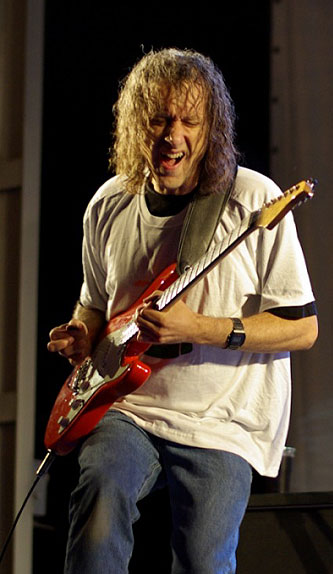 SH:
Well, you know, I mean different people have different opinions about
blues. I was brought up with the blues. It’s in my heart and
soul and always will be and no matter what kind of music that I learn
to enjoy or learn to play, that will always be the music that taught
me how to play the guitar and will always be my roots, and I can never
leave my roots and I never will. And for that reason, I’ll always
be a blues guitarist and blues will always show up in my music in
one way or another. Other people were just never were brought up with
the blues, like when I hear Pat Metheny play, Kurt Rosenwinkel, or
Allan (Holdsworth) or some of these other guys, they sound more European
to me. They don’t sound like they were brought up listening to
Albert King. They sound like they were more brought up listening to
Wes Montgomery and guys like that, which is great too, because I love
Pat Metheny, I love Kurt Rosenwinkel, I love Allan, but it’s
not a bluesy type of playing, ala someone who was definitely brought
up with the blues, and that would be (John) Scofield. You can hear
much more blues influence in his playing.
SH:
Well, you know, I mean different people have different opinions about
blues. I was brought up with the blues. It’s in my heart and
soul and always will be and no matter what kind of music that I learn
to enjoy or learn to play, that will always be the music that taught
me how to play the guitar and will always be my roots, and I can never
leave my roots and I never will. And for that reason, I’ll always
be a blues guitarist and blues will always show up in my music in
one way or another. Other people were just never were brought up with
the blues, like when I hear Pat Metheny play, Kurt Rosenwinkel, or
Allan (Holdsworth) or some of these other guys, they sound more European
to me. They don’t sound like they were brought up listening to
Albert King. They sound like they were more brought up listening to
Wes Montgomery and guys like that, which is great too, because I love
Pat Metheny, I love Kurt Rosenwinkel, I love Allan, but it’s
not a bluesy type of playing, ala someone who was definitely brought
up with the blues, and that would be (John) Scofield. You can hear
much more blues influence in his playing.
MWE3: I really loved your quote, if memory serves, from your
first REH video where you said “I’d rather here Albert King
drop his guitar than hear jazz guys run scales up and down!”
(laughter)
SH: I can stay some pretty stupid stuff sometimes, but to tell
you the truth, there are a lot of guitar players, and I’m not
going to mention any names, but there are a lot of guitar players
who just make me cringe to hear. I cannot listen to a lot of the ‘80s
shredders, just too many notes for me. And when it gets to the point
where I can’t tell the difference between one guy and the other,
that’s when I turn it off. There was a big movement in the ‘80s
of shred guitar where everybody played harmonic minor scales, wide
vibratos, and ending every phrase with the same place in the beat.
There was just so much of this sameness that I just stopped listening
to rock for a while. That’s probably the period where I got more
into just straight ahead jazz because I just wasn’t digging what
was going on in the rock world during the ‘80s. So then I became
this old fart who when I think of rock, I just think of Led Zeppelin
outside of a few bands that I really do like, like Meshuggah and some
of these bands, I mean there’s definitely more current rock bands
that I like, most of the shred metal stuff is not my thing. I appreciate
the virtuosity of what goes into being able to play at those ridiculous
speeds, and I definitely respect it, but for me, it’s like going
to the circus, I mean you go once and you go, “Oh wow!”
and then you go next year. I can’t do it every day. I can listen
to Stevie Ray Vaughn or Jeff Beck every day and never get tired of
it because that music speaks to my soul more than the other stuff.
MWE3: I think it is fair to say that you're one of the guitar
players that has a signature style and someone listening can identify
your style fairly quickly because it’s so individual.
SH: Well I hope so. You can definitely hear some influences
in there, I’m definitely influenced by Beck and there’s
some Scofield influence in there and some Holdsworth and some George
Benson stuff. I listened to him a lot when I was a kid and I definitely
learned a bunch of his licks. But I think if you listen to just about
any guitar player, you hear his individual voice, but you also hear
where some of the inspiration came from. Like when I hear Jeff Beck,
and I don’t know if you ever listened to Les Paul, but you can
tell that Les Paul was a big influence on Jeff Beck. And like Chet
Atkins being a big influence on Tommy Emanuel. Tommy Emanuel sounds
like Tommy, but you can tell that he was influenced by Chet. There
are so many more, like Jimi Hendrix was hugely influenced by Albert
King and so was Stevie Ray Vaughn, even though Hendrix sounds like
Hendrix, and SRV sounds like SRV, you can hear Albert King very easily.
MWE3: Especially Stevie Ray Vaughn…
SH: Yeah big Albert King influence,. But he (SRV) put his own
tilt on it and made it his own, and the same thing could be said of
Michael Brecker who was a huge Coltrane fan and you could hear a lot
of John Coltrane’s playing in Michael Brecker’s, he just
added to it…immensely added to it! (laughs) He was one of the
best musicians in the world, he probably had the biggest vocabulary
and repeated himself less than any other horn player that I could
think of. Wayne Shorter too is another one of my favorites because
I listen to him play because he’s so melodic and nonlinear and
it’s amazing how he can come up with endless melodies and it
sounds like he’s never repeating himself. He’s a brilliant
musician.
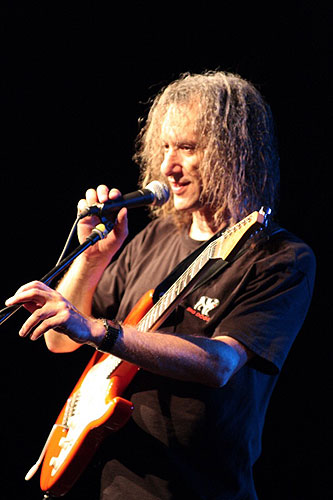 MWE3:
I listen to songs like “Sphinx” and “Church of Xotic
Dance”. I heard what sounded to me like Hendrix influence, with
sounds of the Octavia and the Univibe.
MWE3:
I listen to songs like “Sphinx” and “Church of Xotic
Dance”. I heard what sounded to me like Hendrix influence, with
sounds of the Octavia and the Univibe.
SH: Sure, that’s an Arian SCH1 and is a very Leslie-sounding
pedal. Yeah, I’m old school, man. I’m definitely influenced
by Richie Blackmore, Jimmy Page, Jimi Hendrix, Jeff Beck, you know,
I’m 60! (laughs), I’m an old fart, so what do you want?
(laughs).
MWE3: We want more Scott Henderson! Although to digest this
new record, I feel like an anaconda that just swallowed its prey whole.
There’s so much good playing on the record, I mean some of the
most introspective excursions, like” Festival Of Ghosts”.
SH: Oh thanks! Yeah, I’m pretty proud of that one from
a writing perspective because that’s one of those pieces that’s
thoroughly composed, it doesn’t really return to a lot of its
material except for the chorus. I’m kind of proud of that one
because I remember working a few weeks on writing that tune and throwing
a lot of stuff in the garbage, because I’m one of those guys
that doesn’t always hear. I’m not a gifted composer like
some of these guys. Joe Zawinul was one of those guys that could sit
down and improvise, and there you have "Byrdland". I’m
hardly like that. I go through the process of elimination a lot and
throw a lot of stuff away in the trash before I finally hit on things
that I like. And it takes a lot of patience. You have to be fairly
nice to yourself and not hate yourself everyday like if you don’t
write your most brilliant thing. In fact, one of the most interesting
questions that people always ask, they talk about inspiration and
like what gives you the inspiration to come up with music and I’ve
sort of learned through my career that it’s best not to think
about things like inspiration because inspiration gives you an excuse
not to do your job. If you sit around and wait for inspiration to
hit, you might not do anything. So I sort of look at it like writing’s
my job, I sit down every day and do it, and I’ve written some
of my favorite stuff on days when I wasn’t inspired at all to
sit down to work, I would have rather have gone and watched a movie
or watched TV, or do just about anything else, and yet I make myself
sit down and work and some of those times is when I’ve come up
with my best stuff.
MWE3: Interesting!
SH: Yeah, there’s a famous writer that said that the hardest
part about composing is the application of the ass to the chair! I
kind of dig that! (laughter) I can be lazy, so if I don’t make
myself do it, I won’t, so I make myself sit down and do it.
MWE3: Hey, let’s talk about some general topics! In the
general economy, do you have any feelings about downloads versus CD
sales?
SH: I don’t have anything against downloads, but sadly,
being an audiophile guy like I am, I miss vinyl because I think that
vinyl because I believe sounds better than CDs, but I understand the
move to CDs for a smaller, more compact thing and I also understand
the move to MP3s because you can have tons of music in a tiny little
thing that fits in your pocket and the technology is amazing. When
I’m driving in my car and listening to my iPhone, I can’t
tell the difference because there’s road noise and all that’s
stuff. I listen to music mainly when I’m driving and I don’t
listen at home very much, so MP3s are fine for me.
MWE3: Who do you listen to in your car?
SH: You know what? My iPod is constantly on shuffle, so it’s
constantly going from this to that, and I never know what’s going
to hit me next. It could be ZZ Top, it could be Mozart, it could be
James Brown. It really just plays and I just listen to it.
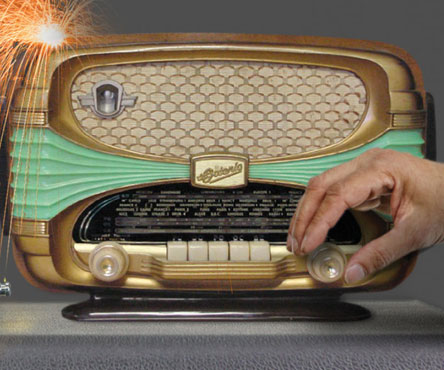 MWE3:
Is there anything that you can do to get more young people to get
hep to your music?
MWE3:
Is there anything that you can do to get more young people to get
hep to your music?
SH: Uh, hire strippers? (laughter)
MWE3: The Church of Xotic Dance! You could start your own religion!
(more laughter)
SH: L. Ron Hubbard did! He did okay! (more laughter) , I’ll
tell you that! But to answer your question about the economy, I don’t
mind the download thing. What I do mind is people calling themselves
fans, and then going to a Russian Bittorrent site and downloading
your albums for free. That’s what I really stand against. There’s
a cartoon on my website if you go to scotthenderson.net and there’s
a little thing that says “Check out Scott’s movie”.
I made an extra normal movie about a guy who doesn’t feel that
he doesn’t need to buy the record, he should just download it
for free because it’s what everybody else is doing and this whole
mentality of music should be free. I don’t know who started that,
but obviously someone who doesn’t do music for a living, that
can’t make the connection between a musician actually working
to support his family just like anybody else that works at any other
job. The fact that he doesn’t have a right to make a living at
what he does is so absurd and ridiculous that it’s really hard
to believe that intelligent people buy into it. If I started a religion,
it would definitely have something to do with strippers...
MWE3: Absolutely, that’s out and out theft. It’s
hard to control unfortunately. A lot of great artists are affected
and get stung in the pocketbook by that. As far as publishing your
music, though, do you have any preferences between Spotify, CD Baby,
Amazon or Youtube.
SH: Not really. Spotify pays very little but it’s a streaming
service, Spotify doesn’t sell music, you just get to listen to
it on the web, you don’t get to download it. I understand why
it’s cheap because you only get to listen as long as you’re
connected to the web, that’s fine, it’s like a preview,
like a movie trailer. Like “Here’s the trailer, if you really
like it, go out and buy the CD, or at least the MP3 version.”
It’s all fine with me, in fact when I signed up for this album
on CD Baby, I chose Spotify as one of the digital partners because
I believe it’s good advertising. If people hear the music on
Spotify, they might go buy the CD, because I think there’s a
lot of people out there who’d still like to have a physical product
in their hands or at least have it on their iPhone so that they can
play it whenever they want.
MWE3: I’ve read some interviews regarding the poor sound
quality of all these guys with their iPhones recording your gigs and
uploading them to Youtube!
SH: (Laughs) Yeah, THAT I can’t deal with (laughs). When
someone sits in front of my Marshall with their iPhone and all you
can hear is the guitar and you can’t hear the bass, and it’s
like super distorted, yeah, I don’t want that stuff on Youtube,
it sounds horrible, so I do pull those videos. But if someone comes
to the gig and records something, and it actually sounds decent, then
I leave it up. I’m not like I’m against Youtube, I have
my own Youtube channel where I have videos that I don’t necessarily
like much bit I don’t hate it. Every once in a while, someone
will come to a concert, and someone came to a concert, I can’t
remember where it was, and they taped a solo that I thought was pretty
decent solo and you could hear the bass, and it wasn’t the best
recorded quality, I thought it sounded pretty good, so I left it up,
but I do remove about 90% of them because they sound horrid.
MWE3: Do you own the rights to the Tribal Tech catalog?
SH: No, Shrapnel Records owns the rights to the catalog or
at least some of it. Tribal Tech was on several different labels so
several different labels owns the rights to that music.
MWE3: One of the things I saw on the Frank Gambale site is
that he had two albums where he made for sale the minus one tracks.
SH: Yeah, I just did that on my record. It’s for sale
on my website right now. You get an MP3 mixes of the bass, drums,
guitar track, click track, and if there was a comping on the solo
track, you get the comping as an extra file, so you just pop those
into your workstation, and you can turn off whichever track you want
to turn off, and jam along, and it comes with pdf charts and the whole
works man! It’s really cool! That’s what I’ve been
working on for the past two weeks, getting that together.
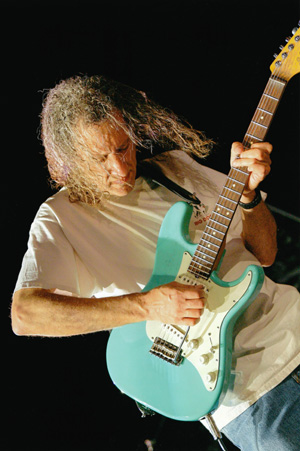 MWE3:
That could be a good revenue stream because there’s a huge developing
community with the modelers, the Axe-Fx and the Kemper. Do you have
any thoughts on the amp modelers?
MWE3:
That could be a good revenue stream because there’s a huge developing
community with the modelers, the Axe-Fx and the Kemper. Do you have
any thoughts on the amp modelers?
SH: Well, put it this way, I can’t get my sound out of
them, but I wouldn’t go so far as to say I don’t recommend
them for other people, because it depends on what type of gigs you’re
doing. If you’re doing studio work, I mean one of those things
could be invaluable, you can go from one sound to the next, you could
be playing a Fender, then all of a sudden be playing a Marshall, or
playing this or that. They’re very very versatile, but every
one of them that I’ve tried, and believe me I’ve had just
about every one of those devices at my house, couldn’t touch
my Marshall, and my Kerry Wright cabinet and my Neve preamp. So there’s
a sound, and it’s not just my fingers,but it’s quality tube
vintage gear, that they just haven’t yet found a way to really,
truly reproduce that sound, and I’m not saying that they won’t,
they just haven’t up to date yet.
MWE3: So you primarily use Kerry Wright cabinets?
SH: Yeah, that guy’s a god to me! (laughs)
MWE3: Where’d you get the inspiration for the album cover,
that’s the coolest retro look!
SH: Oh yeah! You know what? There’s a website called classicradiogallery.com
and I’ve just been a fan of this website. This guy has every
classic radio from every radio manufacturer known to man and I like
to just go on there and look at them! They’re so cool looking!
That’s where I got the inspiration to make the record and he
was kind enough to let me use a photo of one of the cooler looking
radios. They’re all cool looking, I don’t know how I managed
to pick that one out of so many cool ones, but it’s a great site
just for eye candy.
MWE3: I wanted to ask you a question about your outside playing.
You mention John Scofield and he does a lot of outside playing, do
you have any particular guide, do you approach this as a modal concept,
how do you approach your outside playing?
SH: A lot of students ask me that question and it’s really
not what you play when you play outside but one of the unwritten rules
is that the notes that you’re playing when you do play outside
should have some “glue” on them. They should be inside within
themselves, in other words, not just a bunch of random notes from
another pentatonic scale. Pentatonic scales and major triads are very
strong sounds to the ear because we’re so used to hearing them
and when you play them in places that they don’t belong, they
still sound good because they’re such a strong sound within themselves.
So a lot of players use pentatonics and triads and chromaticism within
them to create the lines that they play when they play out and you’ve
got to play with a level of confidence, because if you play timid,
they will sound like wrong notes, but if you play with confidence,
you can get away with playing just about anything. You can go up a
half step, which is about as out as you can get, where just about
every single note is wrong, but millions of sax players do it and
it sounds great because they do with a level of confidence.
MWE3: That’s very interesting and many people I am sure
will find this information useful to incorporate into their playing.
SH: Yeah, I think it’s not what you play, it’s how
you play it. Another essential thing is coming back in on a strong
beat of the music. In other words, if there was a 4-bar phrase, you
might play in on bar 1, out on bars 2,3,4, and come back in on measure
5, which is the beginning of the next 4-bar phrase where it’s
sort of like a release. We tend to hear things in groups of four,
and again, that’s an unwritten rule, it’s not like you have
to do that, but it’s a pleasing thing to do to resolve on a strong
beat, so if you were to play in C major then go out for three measures
and then come back on an E in the 5th measure, it sort of resolves
and you sort of “come home” at a strong point the beat,
and that’s also a part of making outside playing sound good.
But like I say, it’s an unwritten rule, and it’s not like
you have to do that, it’s just one of the ways you could practice
it.
MWE3: Yeah, it’s a great technique, you certainly have
really mastered the technique, it’s an integral part of your
playing and really peppers up and spices up your lines and everyone
else loves that style. You mentioned John Scofield who does a lot
of that.
SH: Yeah, he’s great. He’s always been one of my
favorite semi-jazz guitar players. In a way, he’s like me. His
roots are in the blues. He can play over changes, but can also play
a straight blues and play funk, and he’s just an all-around,
really versatile guitarist. I really like him a lot.
 MWE3:
Have you changed your philosophy regarding practice? Do you still
practice the same way now as you did before?
MWE3:
Have you changed your philosophy regarding practice? Do you still
practice the same way now as you did before?
SH: I do! The only thing is that as I’ve chosen to have
a career, and if you choose to have a career, you’re going to
have let go of a lot of your practice time. A lot of time has to be
spent on writing and rehearsals, being on the road, playing your music.
I don’t get to just sit around at home and study guitar like
I did when I was a student and I miss that because there are obviously
a million things I don’t know about the instrument, millions
of things to learn as there always will be throughout our lives. We’re
all a work in progress! (laughs) I miss those days when I used to
be able to sit down and practice for eight hours a day and discover
new things on the guitar, but right now I if I have my choice of doing
that or writing the next album, I’m going to choose writing for
my next album because that’s where I’m at, that’s what
I’ve chosen as a career, so I’ve got to use the fuel that
I have, and in between, I find these little moments where I have time
to transcribe and learn some new tricks here and there.
MWE3: Moving to your equipment, are you still using your signature
Suhr Strat as your main guitar?
SH: Yeah, that’s my main guitar and my main amp is still
the SH100 which is pretty much a Marshall clone with a master volume.
MWE3: A master volume!
SH: Yeah, 100 watt Marshalls are pretty much useless without
a master volume because you really need eight speakers with them and
to get them to distort, you really have to turn them up to 7 or 8,
and if you try to use four speakers, you’re going to blow them
up, so you’ve got to have a master volume amp if you’re
playing a 100 watt amp or you’re just going to fry your speaker
cabinet. I don’t have room to begin with for four speakers let
alone a full stack.
MWE3: Yes, and I don’t think your neighbors would appreciate
it.
SH: Probably not.
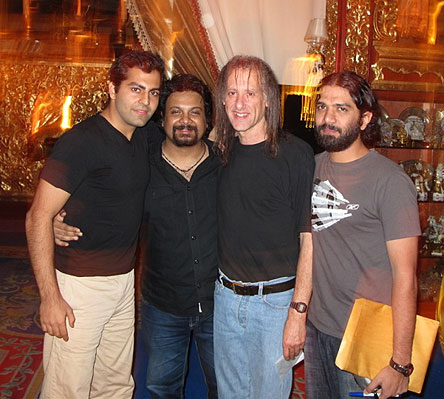 MWE3:
Do you use any kind of attenuator system?
MWE3:
Do you use any kind of attenuator system?
SH: My “attenuator” is I had some carpenters come
over and push the windows out of the wall and wall it up. I have a
room with no windows and even though the floor hasn’t been isolated
from the rest of the house, the ports under the house have been covered
too. And I also spent a bunch of money, like about $2,000 bucks or
something like that, for one of those split air conditioners where
the actual air conditioner is outside, and the air comes into a tiny
hole in the wall, and then you have the vent that covers that hole
and directs the air wherever it goes. Because if you have a standard
air conditioner in your room, that’s just like having an open
window.
MWE3: Yes, and the sound will pour out.
SH: Yeah, the sound goes out just like it would through an
open window, there’s a huge hole in the wall, so I had this split
air conditioner put in where the only hole in the wall is just a one
inch hole and so I can crank my amp at my house until about 10:00
or 11:00 at night and no one complains.
MWE3: That’s a good system.
SH: Yeah, I needed it because I need to crank up, because with
ever attenuator I’ve ever heard, once you get it past the first
couple of notches, you start hearing a loss of tone, so I’m old
school. There’s nothing that sounds better than just a cranked
amp really loud. (laughs)
MWE3: So you use the entire room, you don’t have the amp
in a closet?
SH: I’m using the entire room even though it’s not
a big room, it’s just about 13 feet by 13 feet, so unfortunately,
a room mic sounds pretty horrible. In a bigger room, I’d use
a room mic to add some tone, but in this particular room I can’t,
because if you put a room mic, it sounds kind of tanky, but I do have
prime acoustic type of paneling, it covers about 30% of the room,
maybe even 40% of the room and a wood floor, and it actually sounds
pretty dead, and pretty nice, so I’m getting a pretty decent
guitar tone, in fact I get a better tone here at home than I do at
most studios where I’ve recorded in town.
MWE3: So the mic is outside the room. Is that the idea?
SH: Well, I have two rooms. The one room has my computer and all my
gear and my amps and stuff and then I run a speaker cord from my head,
through the wall, into the other room where I have my speaker cabinet
and that’s the recording room and that’s the room with no
windows.
MWE3: Okay, I think I picture the setup, so you pretty much
can start moving air out of the speaker cabinet and get that sound.
SH: Yeah, without killing the neighbors.
MWE3: Now is it true that you have something like 100 pedals?
SH: Yeah, maybe even more (laughs). They’re not all distortion
pedals but they’re all kinds of weird effects pedals and stuff,
and I love noisy pedals and just stuff, I’m kind of a pedal junkie,
I collect them as a hobby. And I’m always over at Truetone Music
in Santa Monica trying new ones out and I’ve got some pretty
whacky ones. One that I really really like and I don’t know if
you noticed but on the solo on "The Covered Head”, on that
tune, there’s some really warbly, weird undercurrents going on?
MWE3: Yeah, I was going to ask you about that effect.
SH: That’s a Trombetta Rotobone pedal which is a fuzz,
and it sounds really cool, it’s a very cool sounding fuzz, if
you pick light, it sounds like a regular distortion pedal, but the
heavier you pick, the more of that really weird undercurrent comes
out, almost like a ring modulator effect.
MWE3: I was about to ask you, I think in "Sphinx",
at about 3:20 at the intro of your solo, it sounds like the modulation
starts speeding up.
SH: Yeah, that must me with my hand on the speed dial. (laughter)
I just took the speed knob and started turning it up.
MWE3: Yeah it reminded me of the beginning of "Pirates"
by Emerson, Lake & Palmer, where the chord sounds and then begins
speeding up and sounds like a coin flipping on the table.
SH: I don’t remember that, but cool. I’m into that
kind of stuff.
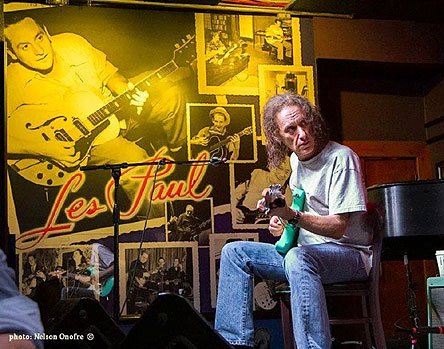 MWE3:
So what were your favorite effect that you used on this album? Did
you use a Roger Mayer or Dunlop Octavia?
MWE3:
So what were your favorite effect that you used on this album? Did
you use a Roger Mayer or Dunlop Octavia?
SH: No the Octavia was a Fulltone Octafuzz. I’ve been
using that for many years. It’s a great one. It’s a little
darker than the rest of them. And mostly on the record, I’m using
an RC Booster, a Church of Tone 50 By Love pedal and I also used the
Vertex boost, and let’s see, my main distortion pedal on the
record was a Klon Centaur, which was a really nice distortion pedal,
and I think I also use the Plimsoul and (Maxeon) SD9 here and there.
MWE3: Yeah, the SD9 I know you go with a ways.
SH: Yeah, I always end up using that at some point. That’s
a great pedal. It’s hard to remember which pedal I used on “Dew
Wut”, but I have it written down because I like to log everything
I do. I’m pretty anal about that. As soon I’m finished recording
something, I write down the amp, the settings, the pedal I used, its
settings…I’m very anal because if I ever want to get that
sound again, I want to know how I got it, I don’t want to just
dial it in by ear, because that would take forever.
MWE3: You need your original equipment (and settings) to duplicate
your sound in the same way.
SH: Yeah, this way if I want that sound again, I can just dial
it right up.
MWE3: That’s really smart!
SH: Yeah it takes a little length of time in the recording
process but it’s worth it because I have gone back and said “Oh
man, I wished I could get that sound” and I have no idea how
I got it…that’s frustrating!
MWE3: Well, its’ been a really fantastic time, Scott,
thank you so much!
SH: I really appreciate this and can’t thank you enough
for having me on!
Thanks
to Scott Henderson @ www.ScottHenderson.net



